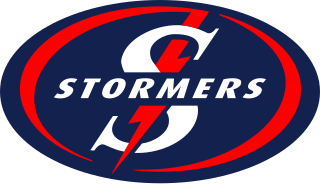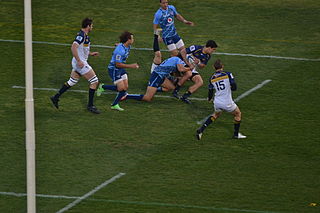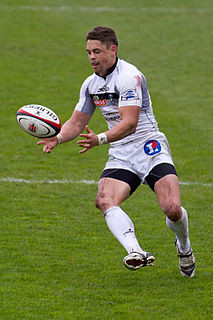
Super Rugby is a men's professional rugby union club competition currently involving teams from Australia and New Zealand. It previously included teams from South Africa, Argentina, and Japan. Building on various Southern Hemisphere competitions dating back to the South Pacific Championship in 1986, with teams from a number of southern nations, the Super Rugby started as the Super 12 in the 1996 season with 12 teams from 3 nations: Australia, New Zealand, and South Africa. The Super 12 was established by SANZAR after the sport became professional in 1995. At its peak the tournament featured the top players from nations representing 16 of the 24 top-three finishes in the history of the Rugby World Cup, and is widely regarded as rugby union's strongest provincial competition. After the COVID-19 pandemic forced the competition to split into three, the reformed competition in 2021 and beyond will only include Australian and New Zealand clubs.

The Bulls, for sponsorship reasons known as the Vodacom Bulls, is a South African professional rugby union team based in Pretoria and they play their home matches at Loftus Versfeld. Prior to 1998, the Bulls competed in the then-Super 12 as Northern Transvaal, as in those years South Africa was represented in the competition by its top four Currie Cup sides from the previous season, instead of the modern Super Rugby teams. They competed in the Super Rugby until 2020.

The Stormers is a South African professional rugby union team based in Cape Town in the Western Cape, they competed in the Super Rugby competition until 2020.

The Golden Lions is a South African professional rugby union team based in Johannesburg, South Africa who compete in the annual Currie Cup and Vodacom Cup. The team is governed by the Golden Lions Rugby Union (GLRU), and was originally known as Transvaal, before changes to the political landscape in South Africa forced a name change to the Gauteng Lions, before again being changed to the Golden Lions. The GLRU also operate the Lions, who also draw players from Griquas.
The 2006 Super 14 season started on Friday 10 February 2006. The Grand Final was held on Saturday 27 May 2006. Super 14 is a provincial rugby union competition with 14 teams from New Zealand, Australia and South Africa. This season was the first of the expansion, which saw two new teams, the Western Force and the Cheetahs, join the Super 12/14. The addition of two new teams led to the name change from the Super 12. It was also the first year for a new Super 14 trophy.
Steven Robert Sykes is a South African rugby union player, currently playing for Oyonnax in the French Top14. His regular position is lock.

The Southern Kings were a South African professional rugby union team that competed in Super Rugby and Pro14. They were based in Port Elizabeth in the Eastern Cape province and played their home matches at Nelson Mandela Bay Stadium. They were created in 2009, and had their first match against the British & Irish Lions during their 2009 tour. After competing in Super Rugby in 2013, 2016 and 2017, they joined Pro14 prior to the 2017–18 season, along with the Cheetahs.
Darron Paul Nell is a South African rugby union player, who most recently with the Eastern Province Kings.
Devin André Oosthuizen is a South African rugby union player, who most recently played with the Free State Cheetahs. His regular position is flanker or number eight.

Demetri Catrakilis in Johannesburg is a South African professional rugby union player for the Southern Kings in the Pro14. He previously played for Premiership side Harlequins, Top 14 side Montpellier, for the Stormers and the Southern Kings in Super Rugby, for Western Province in the Currie Cup and Vodacom Cup competition and for the UCT Ikey Tigers in the Varsity Cup.
Louis Daniel van Zyl Fouché is a South African rugby union player for the Cheetahs in the Pro14 and the Free State Cheetahs in the Currie Cup. His regular position is fly-half.
Marnitz Louis Boshoff is a South African rugby union player who usually plays as a fly-half or fullback. He plays for the Bulls in Super Rugby, the Blue Bulls in the Currie Cup and the Blue Bulls XV in the Rugby Challenge, having previously played for South African provincial sides Griquas, the Blue Bulls and the Golden Lions in the Currie Cup and for Super Rugby side the Lions. He also had a short stint with Irish provincial side Connacht in the Pro14.

The 2013 Super Rugby season was the third season of the new 15-team format for the Super Rugby competition involving teams from Australia, New Zealand and South Africa. The tournament was won by the Chiefs, who defeated the Canberra-based Brumbies 27–22 in the competition final. For sponsorship reasons, this competition is known as FxPro Super Rugby in Australia, Investec Super Rugby in New Zealand and Vodacom Super Rugby in South Africa. Including the past incarnations as Super 12 and Super 14, this was the 18th season of the Southern Hemisphere's premier domestic competition. Conference matches took place every weekend from 15 February until 13 July – with a break between rounds 17 and 18 for internationals games – followed by the play-offs series that culminated in the final on 3 August.

Ronald John Cooke is a South African rugby union player, who most recently played domestically for the Eastern Province Kings. His usual position is centre or wing.
The 2014 Super Rugby season is the fourth season of the 15-team format for the Super Rugby competition involving teams from Australia, New Zealand and South Africa. For sponsorship reasons, this competition is known as Asteron Life Super Rugby in Australia, Investec Super Rugby in New Zealand and Vodacom Super Rugby in South Africa. Including its past incarnations as Super 12 and Super 14, this is the 19th season for the Southern Hemisphere's premier transnational club competition. The conference games will take place every weekend from 15 February until 12 July, followed by the finals series, culminating in the grand final on 2 August. The winners of the 2014 Super Rugby Season were the New South Wales Waratahs
The 2015 Super Rugby season was the 20th season of Super Rugby and the fifth season featuring an expanded 15-team format. For sponsorship reasons, this competition was known as Asteron Life Super Rugby in Australia, Investec Super Rugby in New Zealand and Vodacom Super Rugby in South Africa. The round-robin matches took place every weekend from 13 February until 13 June, followed by the finals series and culminating in the final on 4 July. This was the final season that featured a 15-team format.
The 2015 Currie Cup Premier Division was the 77th season in the competition since it started in 1889 and was contested from 7 August to 24 October 2015. The tournament was the top tier of South Africa's premier domestic rugby union competition.
The 2016 Currie Cup Premier Division was the top tier of the second stage of the 2016 Currie Cup, the 78th edition of this annual South African rugby union competition organised by the South African Rugby Union. It was played between 5 August and 22 October 2016 and featured nine teams that qualified through the 2016 Currie Cup qualification competition.
The 2017 Super Rugby season was the 22nd season of Super Rugby, an annual rugby union competition organised by SANZAAR between teams from Argentina, Australia, Japan, New Zealand and South Africa. It was the second season featuring an expanded 18-team format, following the competition's expansion from 15 teams prior to the 2016 season.
The 2017 Super Rugby Final was played between the Lions and the Crusaders. The match, held at Ellis Park in Johannesburg was the 22nd final in the Super Rugby competition's history, and attracted a record crowd attendance of 62,000.









